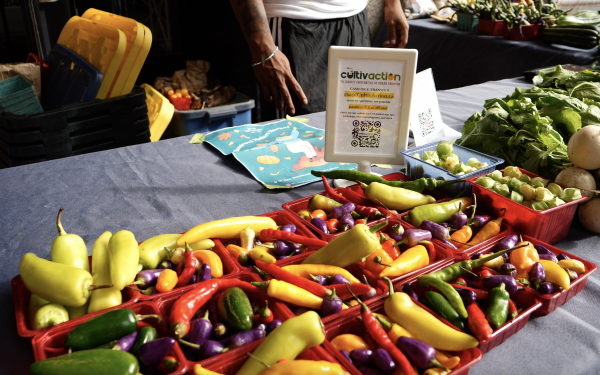Burritoville Making Steady Progress
New Montreal Solidarity Cooperative in Midst of Renovations and Growing Membership
In only seven months under new ownership, the restaurant Burritoville is 70 per cent of where it wants to be.
“This place was basically just a giant wind tunnel before this,” joked Jordan Lindsay, a worker member at Burritoville, referring to ongoing interior renovations to the three-storey restaurant on Bishop St.
After ten years of ownership, a team of three people sold the Mexican-style vegetarian spot to a group working under the Concordia Food Coalition—a student-run, fee-levy organization—last August. This change in ownership was different than just three guys handing the keys over to another pair of hands. Burritoville became a solidarity cooperative, which means it’s run by its membership through a board structure, according to Ashleigh Bond, its administrative coordinator.
There are three types of members for a solidarity coop, Bond explained: worker, user and support members. She, along with Lindsay and 12 other staff, fall under the worker membership status. Three quarters of the staff are Concordia students or alumni, including Lindsay and Bond.
User members pay a one-time, lifelong fee of $10, Bond explained.
“They automatically become an owner of the cooperative,” she said, adding that there are over 200 user members. Worker members have three seats on the restaurant’s board, while the user members have five. The remaining three seats are given to support members, which include a councillor from the Concordia Student Union, a CFC representative and one open spot that the Sustainable Action Fund has filled so far.
Benefits of being a user member include special deals, discounted prices, the ability to vote and run for the board and the chance to have a say on how Burritoville operates, according to Bond.
“We’re working directly for our members,” she said. The coop’s first annual general meeting will be in mid-to-late March.
The restaurant is also a non-profit organization, which means any surplus is directly invested back into the business. Bond said sales are slowly increasing, and that they don’t expect a surplus yet as Burritoville remains a “break-even” model.
“The goal right now is for social benefit and not profit,” she explained.
“The goal right now is for social benefit and not profit,” — Ashleigh Bond, administrative coordinator
Being affordable for students is one of Burritoville’s mandates, according to Bond, as she said prices haven’t changed for the past five years. To offset inflation and the fluctuating Canadian dollar, the restaurant tries to cut in-house costs of employee hours and inventory, Lindsay explained.
“We can’t lie and say it’s not a challenge,” Lindsay commented about the balance of remaining affordable and running a financially sustainable business.
Burritoville won’t sacrifice quality of food to have cheap prices though, as Bond said most of their products are organic. Local sourcing is also a priority, she added. For example, she said a portion of their produce comes from two Concordia students who collect unsold batches from farms around the area, while the sprouts they use come from the greenhouse on the 12th floor of the Hall building.
Becoming a coop
The CFC created a working group in August 2013 to begin assessing the feasibility of purchasing Burritoville and possibly transforming it into a coop, according to Bond.
There were seven founding members of Concordia students and one professor who wanted to make sure Burritoville stayed after the owners left, she said.
An accounting student was hired to analyze the restaurant’s value and see how much it would cost to buy it, while the working group put together a business plan, Bond explained. The first evaluation estimated that Burritoville was worth upward of $270,000, Lindsay recalled.
“This was way outside of the range of what was possible for us,” he said.
With close relations to the former ownership team, Lindsay said they were able to negotiate a price down to $120,000.
In April last year, the council of the CSU approved to give the CFC team $100,000 to help purchase the restaurant. By buying Burritoville, Lindsay explained that they inherited the image rights, liquor license, furniture and kitchen appliances, among other things. They did not buy the physical space itself, as Bond said a woman from the area owns it.
Looking ahead
Being 70 per cent complete, Lindsay said one of the main concerns right now is to insulate the building to deal with the cold. Bond said this should be fixed in the next six months.
In January, Lindsay set up a crowdfunding campaign on Indiegogo.com, mentioning the need to fix how cold the space gets in the winter.
Their goal was to raise $30,000, but they only received $470 from four backers after a month’s time. In the page’s description, it said they need a total of $90,000 to finish the space’s transformation. With this goal still in progress, Bond wants the solidarity coop to be a place where its members and students feel comfortable. It’s already a venue for comedians, musicians and artists to display their work on the second floor. It has a library on the third level.
In five years, Bond wants to buy the building. In ten, she foresees the restaurant having a foundation to help fund community-driven initiatives and events. Lindsay is positive about these changes coming to fruition.
“We’re paving the way here at our own peril if things go awry, but so far things have been going great,” Lindsay said. “I’m loving work here.”

2_900_600_90.jpg)


_900_598_90_600_375_90_s_c1.jpg)
1_copy_600_375_90_s_c1.jpg)
_600_375_90_s_c1.jpg)
